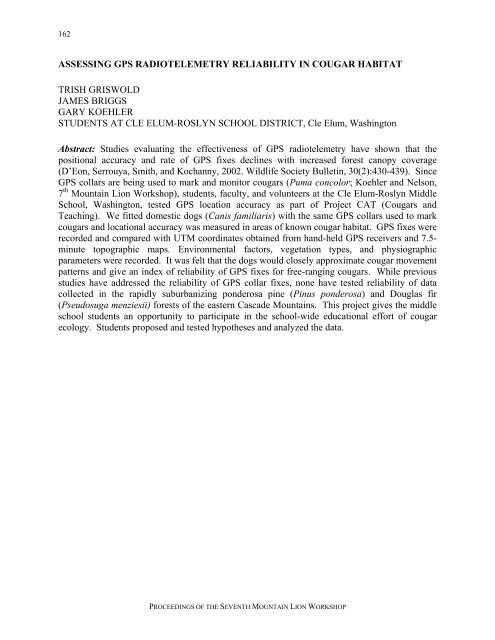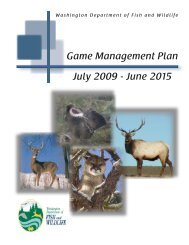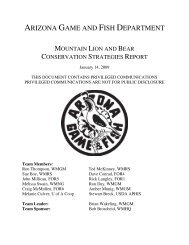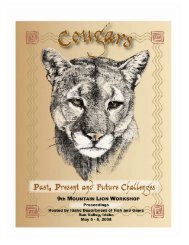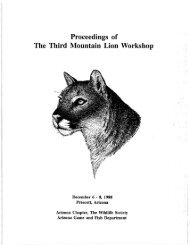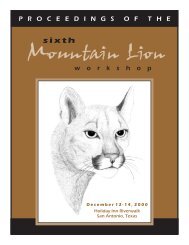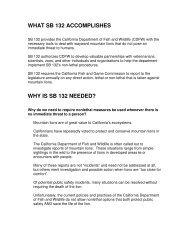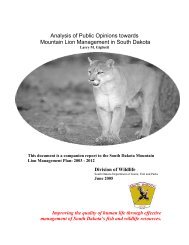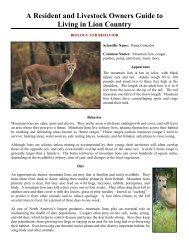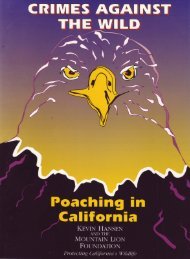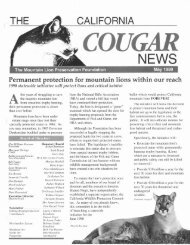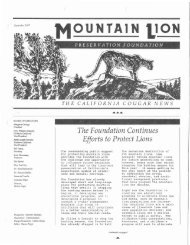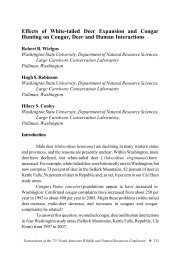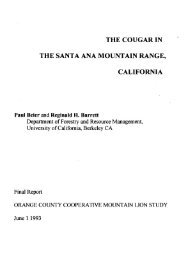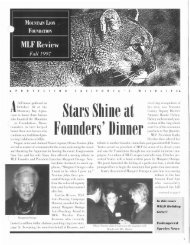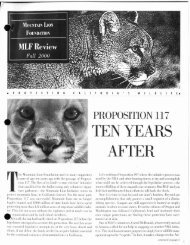Proceedings of the Seventh Mountain Lion Workshop
Proceedings of the Seventh Mountain Lion Workshop
Proceedings of the Seventh Mountain Lion Workshop
Create successful ePaper yourself
Turn your PDF publications into a flip-book with our unique Google optimized e-Paper software.
162<br />
ASSESSING GPS RADIOTELEMETRY RELIABILITY IN COUGAR HABITAT<br />
TRISH GRISWOLD<br />
JAMES BRIGGS<br />
GARY KOEHLER<br />
STUDENTS AT CLE ELUM-ROSLYN SCHOOL DISTRICT, Cle Elum, Washington<br />
Abstract: Studies evaluating <strong>the</strong> effectiveness <strong>of</strong> GPS radiotelemetry have shown that <strong>the</strong><br />
positional accuracy and rate <strong>of</strong> GPS fixes declines with increased forest canopy coverage<br />
(D’Eon, Serrouya, Smith, and Kochanny, 2002. Wildlife Society Bulletin, 30(2):430-439). Since<br />
GPS collars are being used to mark and monitor cougars (Puma concolor; Koehler and Nelson,<br />
7 th <strong>Mountain</strong> <strong>Lion</strong> <strong>Workshop</strong>), students, faculty, and volunteers at <strong>the</strong> Cle Elum-Roslyn Middle<br />
School, Washington, tested GPS location accuracy as part <strong>of</strong> Project CAT (Cougars and<br />
Teaching). We fitted domestic dogs (Canis familiaris) with <strong>the</strong> same GPS collars used to mark<br />
cougars and locational accuracy was measured in areas <strong>of</strong> known cougar habitat. GPS fixes were<br />
recorded and compared with UTM coordinates obtained from hand-held GPS receivers and 7.5minute<br />
topographic maps. Environmental factors, vegetation types, and physiographic<br />
parameters were recorded. It was felt that <strong>the</strong> dogs would closely approximate cougar movement<br />
patterns and give an index <strong>of</strong> reliability <strong>of</strong> GPS fixes for free-ranging cougars. While previous<br />
studies have addressed <strong>the</strong> reliability <strong>of</strong> GPS collar fixes, none have tested reliability <strong>of</strong> data<br />
collected in <strong>the</strong> rapidly suburbanizing ponderosa pine (Pinus ponderosa) and Douglas fir<br />
(Pseudosuga menziesii) forests <strong>of</strong> <strong>the</strong> eastern Cascade <strong>Mountain</strong>s. This project gives <strong>the</strong> middle<br />
school students an opportunity to participate in <strong>the</strong> school-wide educational effort <strong>of</strong> cougar<br />
ecology. Students proposed and tested hypo<strong>the</strong>ses and analyzed <strong>the</strong> data.<br />
PROCEEDINGS OF THE SEVENTH MOUNTAIN LION WORKSHOP


